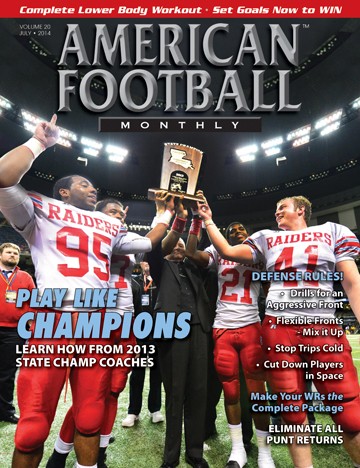AMERICAN FOOTBALL MONTHLY THE #1 RESOURCE FOR FOOTBALL COACHES
|
|
Article Categories
|
AFM’s Annual State Champions Roundupby: AFM Editorial Staff© More from this issueState Champ Coaches’ Profile
Average Age = 48
Average Years as a Head Coach = 13
(22% have 20 or more years experience)
80% are coaches and teachers What are some of the reasons for your success? (multiple answers)
100% said Coaching Staff
98% said Players
72% said Parents Support
69% said Strength and Conditioning
57% said Administration
33% said Boosters
35% said Facilities and equipment
17% said “other”
“Other” included tradition, culture, work ethic, dicipline. Coaching Facts: Work Ethic
40% Spend at least 13 hours
per week reviewing game video.
Average hours spent per week ....The full article can only be seen by subscribers.
Subscribe today!

|
|
|
NOT A SUBSCRIBER?
Subscribe
now to start receiving our monthly magazine PLUS get INSTANT
unlimited access to over 4000 pages of 100 percent football coaching
information, ONLY available at AmericanFootballMonthly.com!
|
|
|
HOME
|
MAGAZINE
|
SUBSCRIBE
|
ONLINE COLUMNISTS
|
COACHING VIDEOS
|
Copyright 2025, AmericanFootballMonthly.com
All Rights Reserved






